Business Ethics: Unethical Practices of US Pharmaceutical Companies
VerifiedAdded on 2023/05/28
|9
|4416
|282
Report
AI Summary
This report examines the unethical practices prevalent in the US pharmaceutical industry. It delves into issues such as price hikes, direct selling to doctors, patent protection, and the establishment of monopolies. The analysis explores the impact of these practices on various stakeholders, including patients, healthcare professionals, and the broader healthcare system. The paper highlights specific examples, such as the scarcity and demand tactics used to inflate drug prices, the influence exerted on doctors through incentives, and the exploitation of patient rebates. Furthermore, the report discusses the commercialization of healthcare, where profit motives often overshadow patient well-being. The study emphasizes the adverse effects of these unethical strategies, including financial burdens on patients, compromised healthcare quality, and erosion of public trust. The report also considers potential remedies, future recommendations, and the implications of these practices on the involved parties. The report also provides a detailed discussion of questionable ethical situations, stakeholder identification, impact, and potential remedies, adhering to strict academic standards and citing relevant sources. The assignment aims to provide a thorough understanding of the ethical challenges in the pharmaceutical sector.
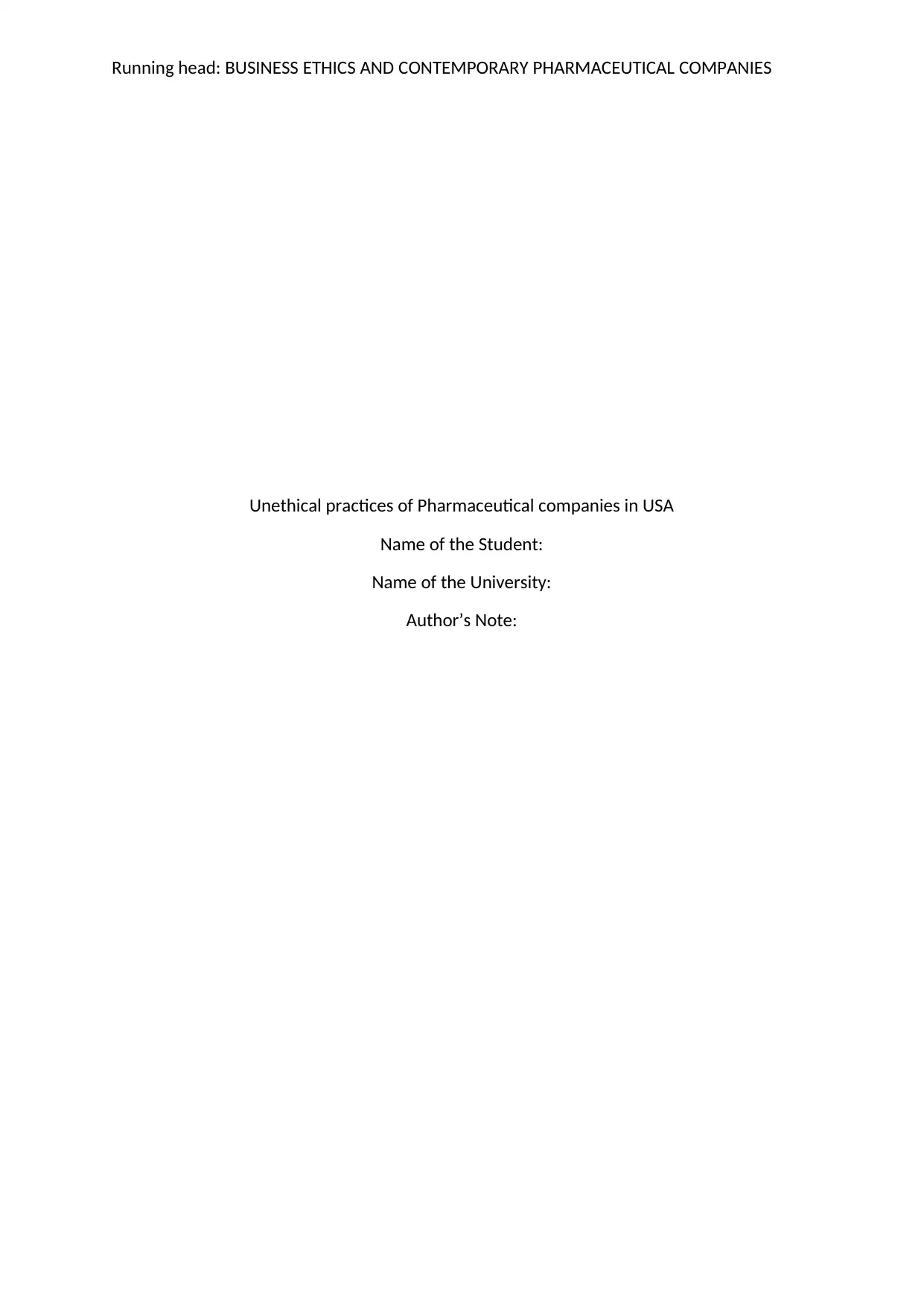
Running head: BUSINESS ETHICS AND CONTEMPORARY PHARMACEUTICAL COMPANIES
Unethical practices of Pharmaceutical companies in USA
Name of the Student:
Name of the University:
Author’s Note:
Unethical practices of Pharmaceutical companies in USA
Name of the Student:
Name of the University:
Author’s Note:
Paraphrase This Document
Need a fresh take? Get an instant paraphrase of this document with our AI Paraphraser
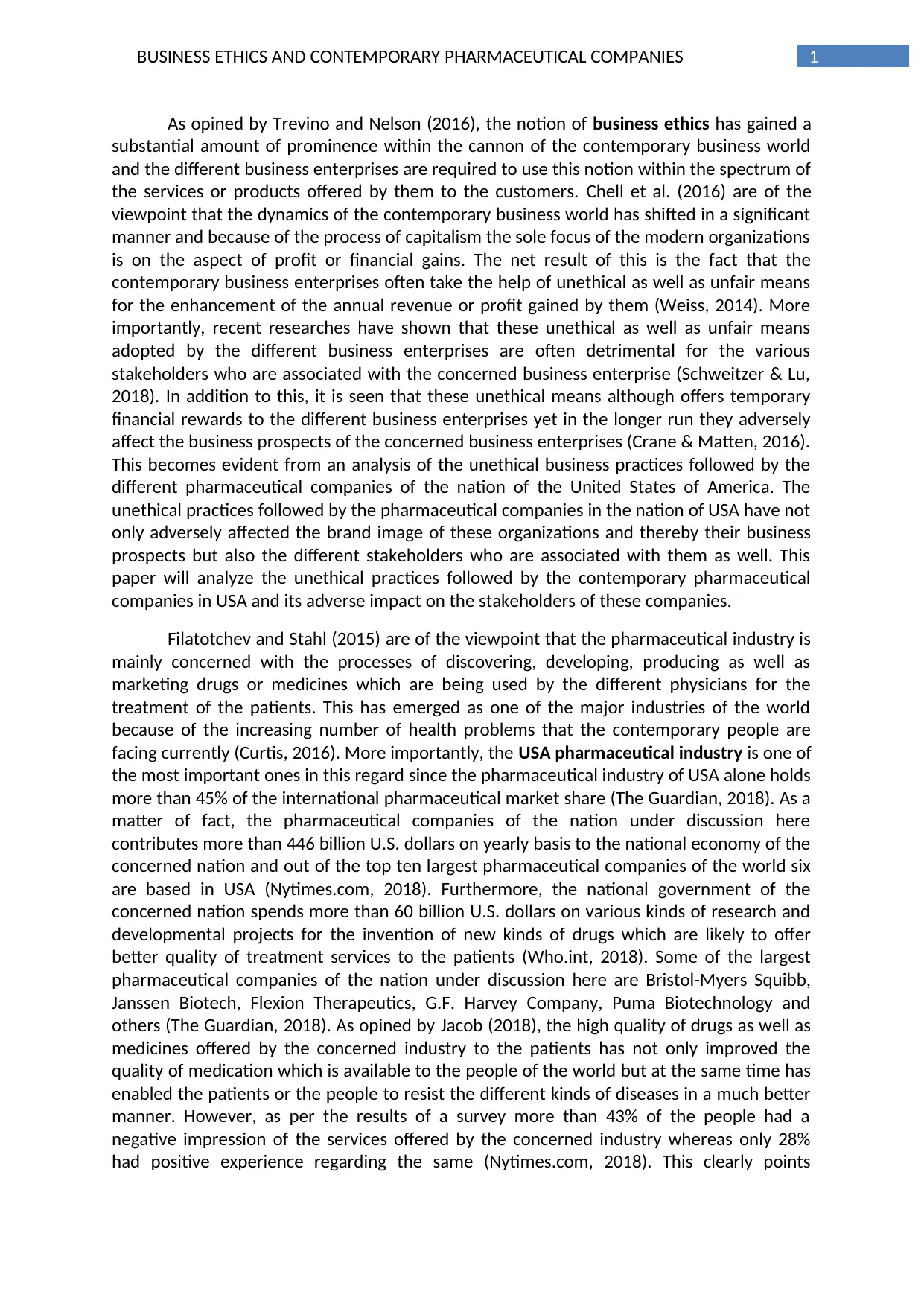
1BUSINESS ETHICS AND CONTEMPORARY PHARMACEUTICAL COMPANIES
As opined by Trevino and Nelson (2016), the notion of business ethics has gained a
substantial amount of prominence within the cannon of the contemporary business world
and the different business enterprises are required to use this notion within the spectrum of
the services or products offered by them to the customers. Chell et al. (2016) are of the
viewpoint that the dynamics of the contemporary business world has shifted in a significant
manner and because of the process of capitalism the sole focus of the modern organizations
is on the aspect of profit or financial gains. The net result of this is the fact that the
contemporary business enterprises often take the help of unethical as well as unfair means
for the enhancement of the annual revenue or profit gained by them (Weiss, 2014). More
importantly, recent researches have shown that these unethical as well as unfair means
adopted by the different business enterprises are often detrimental for the various
stakeholders who are associated with the concerned business enterprise (Schweitzer & Lu,
2018). In addition to this, it is seen that these unethical means although offers temporary
financial rewards to the different business enterprises yet in the longer run they adversely
affect the business prospects of the concerned business enterprises (Crane & Matten, 2016).
This becomes evident from an analysis of the unethical business practices followed by the
different pharmaceutical companies of the nation of the United States of America. The
unethical practices followed by the pharmaceutical companies in the nation of USA have not
only adversely affected the brand image of these organizations and thereby their business
prospects but also the different stakeholders who are associated with them as well. This
paper will analyze the unethical practices followed by the contemporary pharmaceutical
companies in USA and its adverse impact on the stakeholders of these companies.
Filatotchev and Stahl (2015) are of the viewpoint that the pharmaceutical industry is
mainly concerned with the processes of discovering, developing, producing as well as
marketing drugs or medicines which are being used by the different physicians for the
treatment of the patients. This has emerged as one of the major industries of the world
because of the increasing number of health problems that the contemporary people are
facing currently (Curtis, 2016). More importantly, the USA pharmaceutical industry is one of
the most important ones in this regard since the pharmaceutical industry of USA alone holds
more than 45% of the international pharmaceutical market share (The Guardian, 2018). As a
matter of fact, the pharmaceutical companies of the nation under discussion here
contributes more than 446 billion U.S. dollars on yearly basis to the national economy of the
concerned nation and out of the top ten largest pharmaceutical companies of the world six
are based in USA (Nytimes.com, 2018). Furthermore, the national government of the
concerned nation spends more than 60 billion U.S. dollars on various kinds of research and
developmental projects for the invention of new kinds of drugs which are likely to offer
better quality of treatment services to the patients (Who.int, 2018). Some of the largest
pharmaceutical companies of the nation under discussion here are Bristol-Myers Squibb,
Janssen Biotech, Flexion Therapeutics, G.F. Harvey Company, Puma Biotechnology and
others (The Guardian, 2018). As opined by Jacob (2018), the high quality of drugs as well as
medicines offered by the concerned industry to the patients has not only improved the
quality of medication which is available to the people of the world but at the same time has
enabled the patients or the people to resist the different kinds of diseases in a much better
manner. However, as per the results of a survey more than 43% of the people had a
negative impression of the services offered by the concerned industry whereas only 28%
had positive experience regarding the same (Nytimes.com, 2018). This clearly points
As opined by Trevino and Nelson (2016), the notion of business ethics has gained a
substantial amount of prominence within the cannon of the contemporary business world
and the different business enterprises are required to use this notion within the spectrum of
the services or products offered by them to the customers. Chell et al. (2016) are of the
viewpoint that the dynamics of the contemporary business world has shifted in a significant
manner and because of the process of capitalism the sole focus of the modern organizations
is on the aspect of profit or financial gains. The net result of this is the fact that the
contemporary business enterprises often take the help of unethical as well as unfair means
for the enhancement of the annual revenue or profit gained by them (Weiss, 2014). More
importantly, recent researches have shown that these unethical as well as unfair means
adopted by the different business enterprises are often detrimental for the various
stakeholders who are associated with the concerned business enterprise (Schweitzer & Lu,
2018). In addition to this, it is seen that these unethical means although offers temporary
financial rewards to the different business enterprises yet in the longer run they adversely
affect the business prospects of the concerned business enterprises (Crane & Matten, 2016).
This becomes evident from an analysis of the unethical business practices followed by the
different pharmaceutical companies of the nation of the United States of America. The
unethical practices followed by the pharmaceutical companies in the nation of USA have not
only adversely affected the brand image of these organizations and thereby their business
prospects but also the different stakeholders who are associated with them as well. This
paper will analyze the unethical practices followed by the contemporary pharmaceutical
companies in USA and its adverse impact on the stakeholders of these companies.
Filatotchev and Stahl (2015) are of the viewpoint that the pharmaceutical industry is
mainly concerned with the processes of discovering, developing, producing as well as
marketing drugs or medicines which are being used by the different physicians for the
treatment of the patients. This has emerged as one of the major industries of the world
because of the increasing number of health problems that the contemporary people are
facing currently (Curtis, 2016). More importantly, the USA pharmaceutical industry is one of
the most important ones in this regard since the pharmaceutical industry of USA alone holds
more than 45% of the international pharmaceutical market share (The Guardian, 2018). As a
matter of fact, the pharmaceutical companies of the nation under discussion here
contributes more than 446 billion U.S. dollars on yearly basis to the national economy of the
concerned nation and out of the top ten largest pharmaceutical companies of the world six
are based in USA (Nytimes.com, 2018). Furthermore, the national government of the
concerned nation spends more than 60 billion U.S. dollars on various kinds of research and
developmental projects for the invention of new kinds of drugs which are likely to offer
better quality of treatment services to the patients (Who.int, 2018). Some of the largest
pharmaceutical companies of the nation under discussion here are Bristol-Myers Squibb,
Janssen Biotech, Flexion Therapeutics, G.F. Harvey Company, Puma Biotechnology and
others (The Guardian, 2018). As opined by Jacob (2018), the high quality of drugs as well as
medicines offered by the concerned industry to the patients has not only improved the
quality of medication which is available to the people of the world but at the same time has
enabled the patients or the people to resist the different kinds of diseases in a much better
manner. However, as per the results of a survey more than 43% of the people had a
negative impression of the services offered by the concerned industry whereas only 28%
had positive experience regarding the same (Nytimes.com, 2018). This clearly points
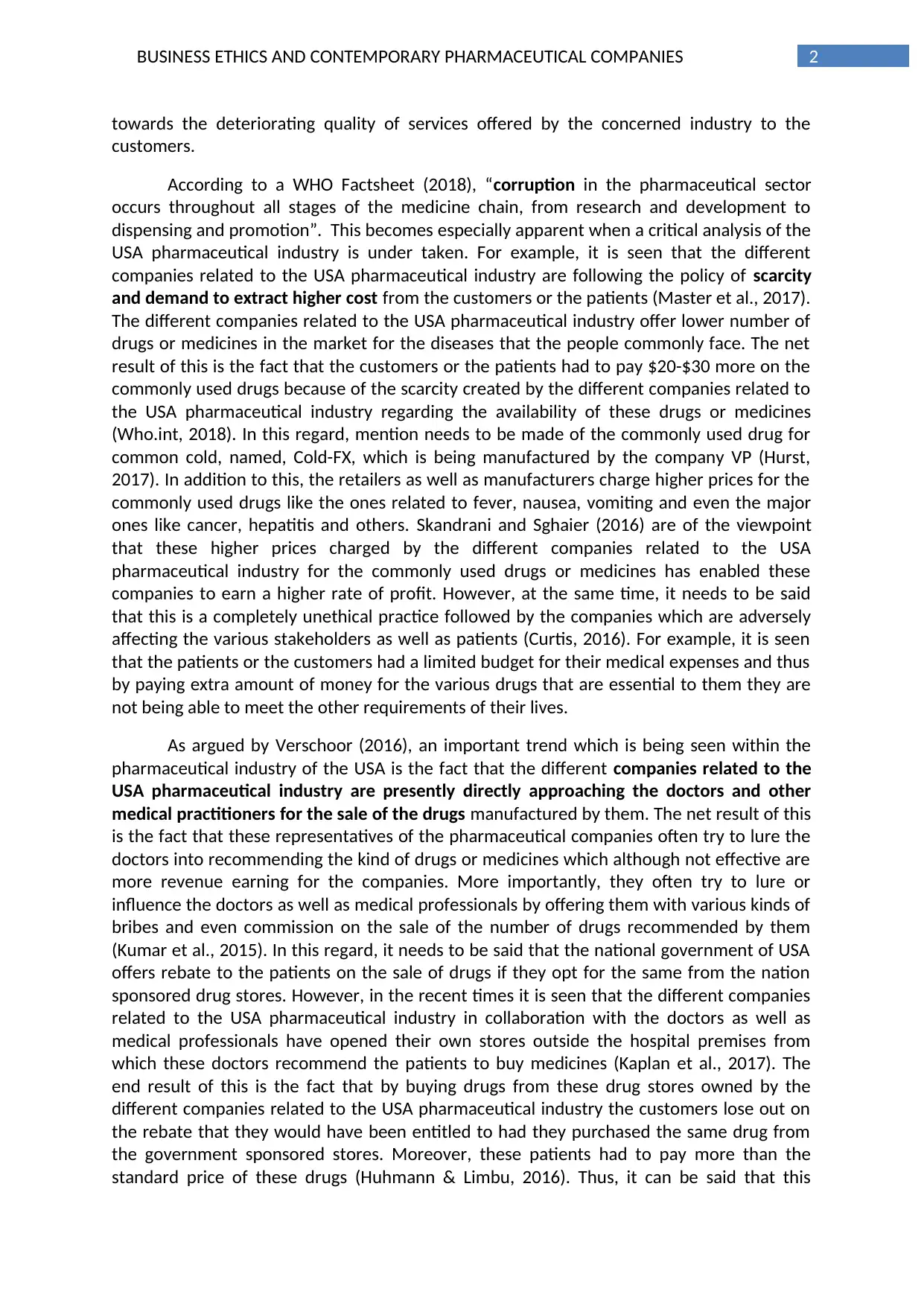
2BUSINESS ETHICS AND CONTEMPORARY PHARMACEUTICAL COMPANIES
towards the deteriorating quality of services offered by the concerned industry to the
customers.
According to a WHO Factsheet (2018), “corruption in the pharmaceutical sector
occurs throughout all stages of the medicine chain, from research and development to
dispensing and promotion”. This becomes especially apparent when a critical analysis of the
USA pharmaceutical industry is under taken. For example, it is seen that the different
companies related to the USA pharmaceutical industry are following the policy of scarcity
and demand to extract higher cost from the customers or the patients (Master et al., 2017).
The different companies related to the USA pharmaceutical industry offer lower number of
drugs or medicines in the market for the diseases that the people commonly face. The net
result of this is the fact that the customers or the patients had to pay $20-$30 more on the
commonly used drugs because of the scarcity created by the different companies related to
the USA pharmaceutical industry regarding the availability of these drugs or medicines
(Who.int, 2018). In this regard, mention needs to be made of the commonly used drug for
common cold, named, Cold-FX, which is being manufactured by the company VP (Hurst,
2017). In addition to this, the retailers as well as manufacturers charge higher prices for the
commonly used drugs like the ones related to fever, nausea, vomiting and even the major
ones like cancer, hepatitis and others. Skandrani and Sghaier (2016) are of the viewpoint
that these higher prices charged by the different companies related to the USA
pharmaceutical industry for the commonly used drugs or medicines has enabled these
companies to earn a higher rate of profit. However, at the same time, it needs to be said
that this is a completely unethical practice followed by the companies which are adversely
affecting the various stakeholders as well as patients (Curtis, 2016). For example, it is seen
that the patients or the customers had a limited budget for their medical expenses and thus
by paying extra amount of money for the various drugs that are essential to them they are
not being able to meet the other requirements of their lives.
As argued by Verschoor (2016), an important trend which is being seen within the
pharmaceutical industry of the USA is the fact that the different companies related to the
USA pharmaceutical industry are presently directly approaching the doctors and other
medical practitioners for the sale of the drugs manufactured by them. The net result of this
is the fact that these representatives of the pharmaceutical companies often try to lure the
doctors into recommending the kind of drugs or medicines which although not effective are
more revenue earning for the companies. More importantly, they often try to lure or
influence the doctors as well as medical professionals by offering them with various kinds of
bribes and even commission on the sale of the number of drugs recommended by them
(Kumar et al., 2015). In this regard, it needs to be said that the national government of USA
offers rebate to the patients on the sale of drugs if they opt for the same from the nation
sponsored drug stores. However, in the recent times it is seen that the different companies
related to the USA pharmaceutical industry in collaboration with the doctors as well as
medical professionals have opened their own stores outside the hospital premises from
which these doctors recommend the patients to buy medicines (Kaplan et al., 2017). The
end result of this is the fact that by buying drugs from these drug stores owned by the
different companies related to the USA pharmaceutical industry the customers lose out on
the rebate that they would have been entitled to had they purchased the same drug from
the government sponsored stores. Moreover, these patients had to pay more than the
standard price of these drugs (Huhmann & Limbu, 2016). Thus, it can be said that this
towards the deteriorating quality of services offered by the concerned industry to the
customers.
According to a WHO Factsheet (2018), “corruption in the pharmaceutical sector
occurs throughout all stages of the medicine chain, from research and development to
dispensing and promotion”. This becomes especially apparent when a critical analysis of the
USA pharmaceutical industry is under taken. For example, it is seen that the different
companies related to the USA pharmaceutical industry are following the policy of scarcity
and demand to extract higher cost from the customers or the patients (Master et al., 2017).
The different companies related to the USA pharmaceutical industry offer lower number of
drugs or medicines in the market for the diseases that the people commonly face. The net
result of this is the fact that the customers or the patients had to pay $20-$30 more on the
commonly used drugs because of the scarcity created by the different companies related to
the USA pharmaceutical industry regarding the availability of these drugs or medicines
(Who.int, 2018). In this regard, mention needs to be made of the commonly used drug for
common cold, named, Cold-FX, which is being manufactured by the company VP (Hurst,
2017). In addition to this, the retailers as well as manufacturers charge higher prices for the
commonly used drugs like the ones related to fever, nausea, vomiting and even the major
ones like cancer, hepatitis and others. Skandrani and Sghaier (2016) are of the viewpoint
that these higher prices charged by the different companies related to the USA
pharmaceutical industry for the commonly used drugs or medicines has enabled these
companies to earn a higher rate of profit. However, at the same time, it needs to be said
that this is a completely unethical practice followed by the companies which are adversely
affecting the various stakeholders as well as patients (Curtis, 2016). For example, it is seen
that the patients or the customers had a limited budget for their medical expenses and thus
by paying extra amount of money for the various drugs that are essential to them they are
not being able to meet the other requirements of their lives.
As argued by Verschoor (2016), an important trend which is being seen within the
pharmaceutical industry of the USA is the fact that the different companies related to the
USA pharmaceutical industry are presently directly approaching the doctors and other
medical practitioners for the sale of the drugs manufactured by them. The net result of this
is the fact that these representatives of the pharmaceutical companies often try to lure the
doctors into recommending the kind of drugs or medicines which although not effective are
more revenue earning for the companies. More importantly, they often try to lure or
influence the doctors as well as medical professionals by offering them with various kinds of
bribes and even commission on the sale of the number of drugs recommended by them
(Kumar et al., 2015). In this regard, it needs to be said that the national government of USA
offers rebate to the patients on the sale of drugs if they opt for the same from the nation
sponsored drug stores. However, in the recent times it is seen that the different companies
related to the USA pharmaceutical industry in collaboration with the doctors as well as
medical professionals have opened their own stores outside the hospital premises from
which these doctors recommend the patients to buy medicines (Kaplan et al., 2017). The
end result of this is the fact that by buying drugs from these drug stores owned by the
different companies related to the USA pharmaceutical industry the customers lose out on
the rebate that they would have been entitled to had they purchased the same drug from
the government sponsored stores. Moreover, these patients had to pay more than the
standard price of these drugs (Huhmann & Limbu, 2016). Thus, it can be said that this
⊘ This is a preview!⊘
Do you want full access?
Subscribe today to unlock all pages.

Trusted by 1+ million students worldwide
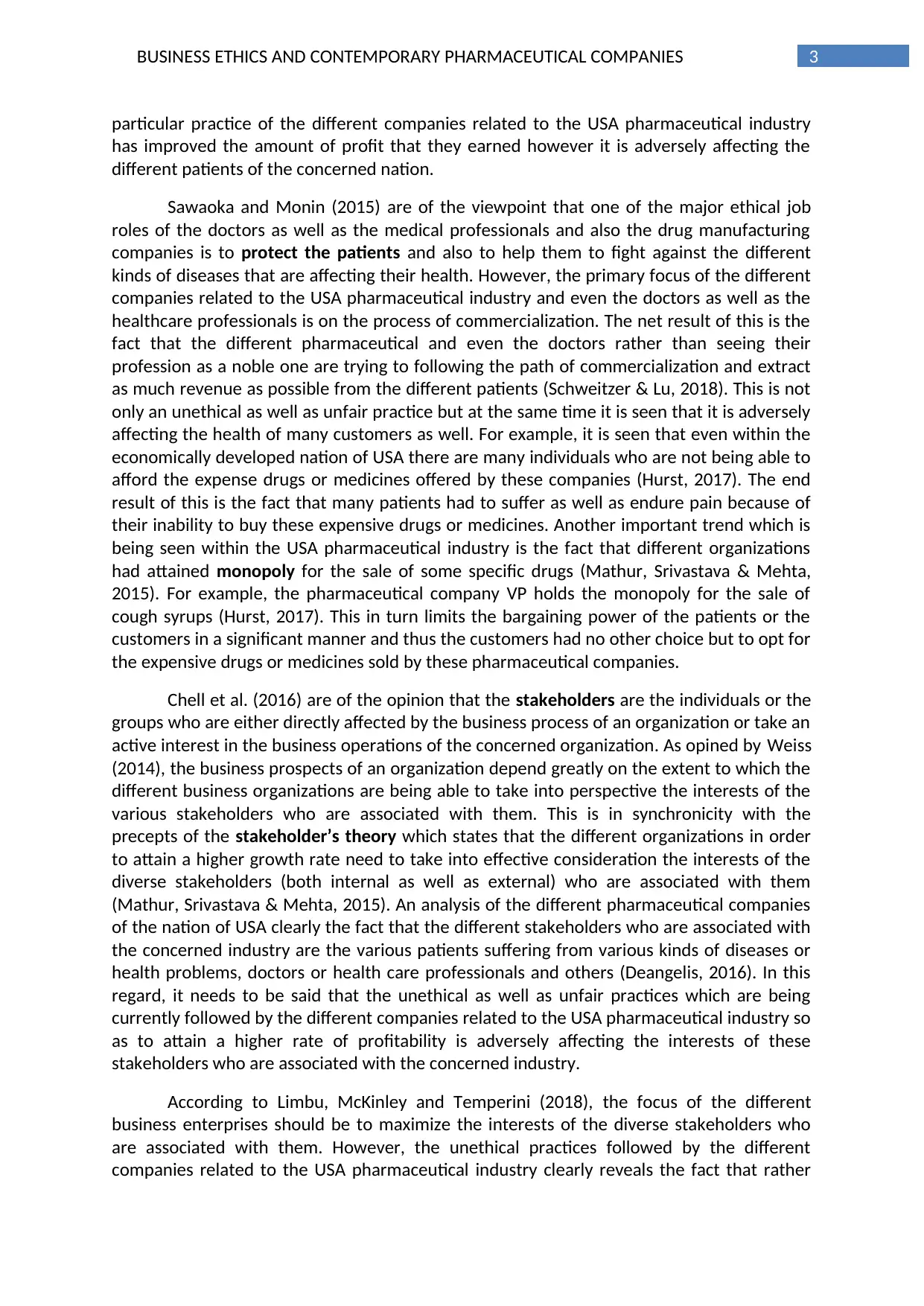
3BUSINESS ETHICS AND CONTEMPORARY PHARMACEUTICAL COMPANIES
particular practice of the different companies related to the USA pharmaceutical industry
has improved the amount of profit that they earned however it is adversely affecting the
different patients of the concerned nation.
Sawaoka and Monin (2015) are of the viewpoint that one of the major ethical job
roles of the doctors as well as the medical professionals and also the drug manufacturing
companies is to protect the patients and also to help them to fight against the different
kinds of diseases that are affecting their health. However, the primary focus of the different
companies related to the USA pharmaceutical industry and even the doctors as well as the
healthcare professionals is on the process of commercialization. The net result of this is the
fact that the different pharmaceutical and even the doctors rather than seeing their
profession as a noble one are trying to following the path of commercialization and extract
as much revenue as possible from the different patients (Schweitzer & Lu, 2018). This is not
only an unethical as well as unfair practice but at the same time it is seen that it is adversely
affecting the health of many customers as well. For example, it is seen that even within the
economically developed nation of USA there are many individuals who are not being able to
afford the expense drugs or medicines offered by these companies (Hurst, 2017). The end
result of this is the fact that many patients had to suffer as well as endure pain because of
their inability to buy these expensive drugs or medicines. Another important trend which is
being seen within the USA pharmaceutical industry is the fact that different organizations
had attained monopoly for the sale of some specific drugs (Mathur, Srivastava & Mehta,
2015). For example, the pharmaceutical company VP holds the monopoly for the sale of
cough syrups (Hurst, 2017). This in turn limits the bargaining power of the patients or the
customers in a significant manner and thus the customers had no other choice but to opt for
the expensive drugs or medicines sold by these pharmaceutical companies.
Chell et al. (2016) are of the opinion that the stakeholders are the individuals or the
groups who are either directly affected by the business process of an organization or take an
active interest in the business operations of the concerned organization. As opined by Weiss
(2014), the business prospects of an organization depend greatly on the extent to which the
different business organizations are being able to take into perspective the interests of the
various stakeholders who are associated with them. This is in synchronicity with the
precepts of the stakeholder’s theory which states that the different organizations in order
to attain a higher growth rate need to take into effective consideration the interests of the
diverse stakeholders (both internal as well as external) who are associated with them
(Mathur, Srivastava & Mehta, 2015). An analysis of the different pharmaceutical companies
of the nation of USA clearly the fact that the different stakeholders who are associated with
the concerned industry are the various patients suffering from various kinds of diseases or
health problems, doctors or health care professionals and others (Deangelis, 2016). In this
regard, it needs to be said that the unethical as well as unfair practices which are being
currently followed by the different companies related to the USA pharmaceutical industry so
as to attain a higher rate of profitability is adversely affecting the interests of these
stakeholders who are associated with the concerned industry.
According to Limbu, McKinley and Temperini (2018), the focus of the different
business enterprises should be to maximize the interests of the diverse stakeholders who
are associated with them. However, the unethical practices followed by the different
companies related to the USA pharmaceutical industry clearly reveals the fact that rather
particular practice of the different companies related to the USA pharmaceutical industry
has improved the amount of profit that they earned however it is adversely affecting the
different patients of the concerned nation.
Sawaoka and Monin (2015) are of the viewpoint that one of the major ethical job
roles of the doctors as well as the medical professionals and also the drug manufacturing
companies is to protect the patients and also to help them to fight against the different
kinds of diseases that are affecting their health. However, the primary focus of the different
companies related to the USA pharmaceutical industry and even the doctors as well as the
healthcare professionals is on the process of commercialization. The net result of this is the
fact that the different pharmaceutical and even the doctors rather than seeing their
profession as a noble one are trying to following the path of commercialization and extract
as much revenue as possible from the different patients (Schweitzer & Lu, 2018). This is not
only an unethical as well as unfair practice but at the same time it is seen that it is adversely
affecting the health of many customers as well. For example, it is seen that even within the
economically developed nation of USA there are many individuals who are not being able to
afford the expense drugs or medicines offered by these companies (Hurst, 2017). The end
result of this is the fact that many patients had to suffer as well as endure pain because of
their inability to buy these expensive drugs or medicines. Another important trend which is
being seen within the USA pharmaceutical industry is the fact that different organizations
had attained monopoly for the sale of some specific drugs (Mathur, Srivastava & Mehta,
2015). For example, the pharmaceutical company VP holds the monopoly for the sale of
cough syrups (Hurst, 2017). This in turn limits the bargaining power of the patients or the
customers in a significant manner and thus the customers had no other choice but to opt for
the expensive drugs or medicines sold by these pharmaceutical companies.
Chell et al. (2016) are of the opinion that the stakeholders are the individuals or the
groups who are either directly affected by the business process of an organization or take an
active interest in the business operations of the concerned organization. As opined by Weiss
(2014), the business prospects of an organization depend greatly on the extent to which the
different business organizations are being able to take into perspective the interests of the
various stakeholders who are associated with them. This is in synchronicity with the
precepts of the stakeholder’s theory which states that the different organizations in order
to attain a higher growth rate need to take into effective consideration the interests of the
diverse stakeholders (both internal as well as external) who are associated with them
(Mathur, Srivastava & Mehta, 2015). An analysis of the different pharmaceutical companies
of the nation of USA clearly the fact that the different stakeholders who are associated with
the concerned industry are the various patients suffering from various kinds of diseases or
health problems, doctors or health care professionals and others (Deangelis, 2016). In this
regard, it needs to be said that the unethical as well as unfair practices which are being
currently followed by the different companies related to the USA pharmaceutical industry so
as to attain a higher rate of profitability is adversely affecting the interests of these
stakeholders who are associated with the concerned industry.
According to Limbu, McKinley and Temperini (2018), the focus of the different
business enterprises should be to maximize the interests of the diverse stakeholders who
are associated with them. However, the unethical practices followed by the different
companies related to the USA pharmaceutical industry clearly reveals the fact that rather
Paraphrase This Document
Need a fresh take? Get an instant paraphrase of this document with our AI Paraphraser
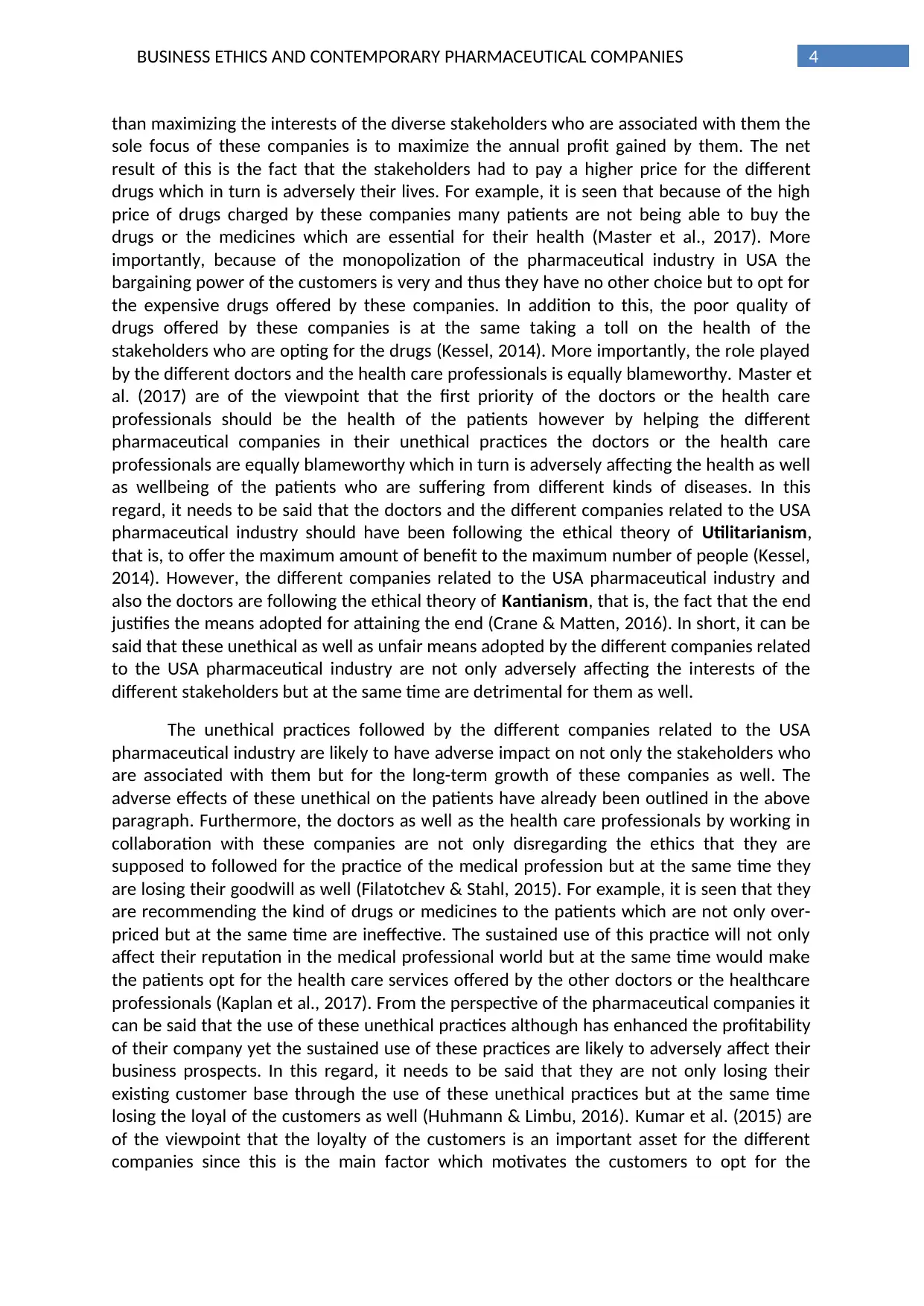
4BUSINESS ETHICS AND CONTEMPORARY PHARMACEUTICAL COMPANIES
than maximizing the interests of the diverse stakeholders who are associated with them the
sole focus of these companies is to maximize the annual profit gained by them. The net
result of this is the fact that the stakeholders had to pay a higher price for the different
drugs which in turn is adversely their lives. For example, it is seen that because of the high
price of drugs charged by these companies many patients are not being able to buy the
drugs or the medicines which are essential for their health (Master et al., 2017). More
importantly, because of the monopolization of the pharmaceutical industry in USA the
bargaining power of the customers is very and thus they have no other choice but to opt for
the expensive drugs offered by these companies. In addition to this, the poor quality of
drugs offered by these companies is at the same taking a toll on the health of the
stakeholders who are opting for the drugs (Kessel, 2014). More importantly, the role played
by the different doctors and the health care professionals is equally blameworthy. Master et
al. (2017) are of the viewpoint that the first priority of the doctors or the health care
professionals should be the health of the patients however by helping the different
pharmaceutical companies in their unethical practices the doctors or the health care
professionals are equally blameworthy which in turn is adversely affecting the health as well
as wellbeing of the patients who are suffering from different kinds of diseases. In this
regard, it needs to be said that the doctors and the different companies related to the USA
pharmaceutical industry should have been following the ethical theory of Utilitarianism,
that is, to offer the maximum amount of benefit to the maximum number of people (Kessel,
2014). However, the different companies related to the USA pharmaceutical industry and
also the doctors are following the ethical theory of Kantianism, that is, the fact that the end
justifies the means adopted for attaining the end (Crane & Matten, 2016). In short, it can be
said that these unethical as well as unfair means adopted by the different companies related
to the USA pharmaceutical industry are not only adversely affecting the interests of the
different stakeholders but at the same time are detrimental for them as well.
The unethical practices followed by the different companies related to the USA
pharmaceutical industry are likely to have adverse impact on not only the stakeholders who
are associated with them but for the long-term growth of these companies as well. The
adverse effects of these unethical on the patients have already been outlined in the above
paragraph. Furthermore, the doctors as well as the health care professionals by working in
collaboration with these companies are not only disregarding the ethics that they are
supposed to followed for the practice of the medical profession but at the same time they
are losing their goodwill as well (Filatotchev & Stahl, 2015). For example, it is seen that they
are recommending the kind of drugs or medicines to the patients which are not only over-
priced but at the same time are ineffective. The sustained use of this practice will not only
affect their reputation in the medical professional world but at the same time would make
the patients opt for the health care services offered by the other doctors or the healthcare
professionals (Kaplan et al., 2017). From the perspective of the pharmaceutical companies it
can be said that the use of these unethical practices although has enhanced the profitability
of their company yet the sustained use of these practices are likely to adversely affect their
business prospects. In this regard, it needs to be said that they are not only losing their
existing customer base through the use of these unethical practices but at the same time
losing the loyal of the customers as well (Huhmann & Limbu, 2016). Kumar et al. (2015) are
of the viewpoint that the loyalty of the customers is an important asset for the different
companies since this is the main factor which motivates the customers to opt for the
than maximizing the interests of the diverse stakeholders who are associated with them the
sole focus of these companies is to maximize the annual profit gained by them. The net
result of this is the fact that the stakeholders had to pay a higher price for the different
drugs which in turn is adversely their lives. For example, it is seen that because of the high
price of drugs charged by these companies many patients are not being able to buy the
drugs or the medicines which are essential for their health (Master et al., 2017). More
importantly, because of the monopolization of the pharmaceutical industry in USA the
bargaining power of the customers is very and thus they have no other choice but to opt for
the expensive drugs offered by these companies. In addition to this, the poor quality of
drugs offered by these companies is at the same taking a toll on the health of the
stakeholders who are opting for the drugs (Kessel, 2014). More importantly, the role played
by the different doctors and the health care professionals is equally blameworthy. Master et
al. (2017) are of the viewpoint that the first priority of the doctors or the health care
professionals should be the health of the patients however by helping the different
pharmaceutical companies in their unethical practices the doctors or the health care
professionals are equally blameworthy which in turn is adversely affecting the health as well
as wellbeing of the patients who are suffering from different kinds of diseases. In this
regard, it needs to be said that the doctors and the different companies related to the USA
pharmaceutical industry should have been following the ethical theory of Utilitarianism,
that is, to offer the maximum amount of benefit to the maximum number of people (Kessel,
2014). However, the different companies related to the USA pharmaceutical industry and
also the doctors are following the ethical theory of Kantianism, that is, the fact that the end
justifies the means adopted for attaining the end (Crane & Matten, 2016). In short, it can be
said that these unethical as well as unfair means adopted by the different companies related
to the USA pharmaceutical industry are not only adversely affecting the interests of the
different stakeholders but at the same time are detrimental for them as well.
The unethical practices followed by the different companies related to the USA
pharmaceutical industry are likely to have adverse impact on not only the stakeholders who
are associated with them but for the long-term growth of these companies as well. The
adverse effects of these unethical on the patients have already been outlined in the above
paragraph. Furthermore, the doctors as well as the health care professionals by working in
collaboration with these companies are not only disregarding the ethics that they are
supposed to followed for the practice of the medical profession but at the same time they
are losing their goodwill as well (Filatotchev & Stahl, 2015). For example, it is seen that they
are recommending the kind of drugs or medicines to the patients which are not only over-
priced but at the same time are ineffective. The sustained use of this practice will not only
affect their reputation in the medical professional world but at the same time would make
the patients opt for the health care services offered by the other doctors or the healthcare
professionals (Kaplan et al., 2017). From the perspective of the pharmaceutical companies it
can be said that the use of these unethical practices although has enhanced the profitability
of their company yet the sustained use of these practices are likely to adversely affect their
business prospects. In this regard, it needs to be said that they are not only losing their
existing customer base through the use of these unethical practices but at the same time
losing the loyal of the customers as well (Huhmann & Limbu, 2016). Kumar et al. (2015) are
of the viewpoint that the loyalty of the customers is an important asset for the different
companies since this is the main factor which motivates the customers to opt for the
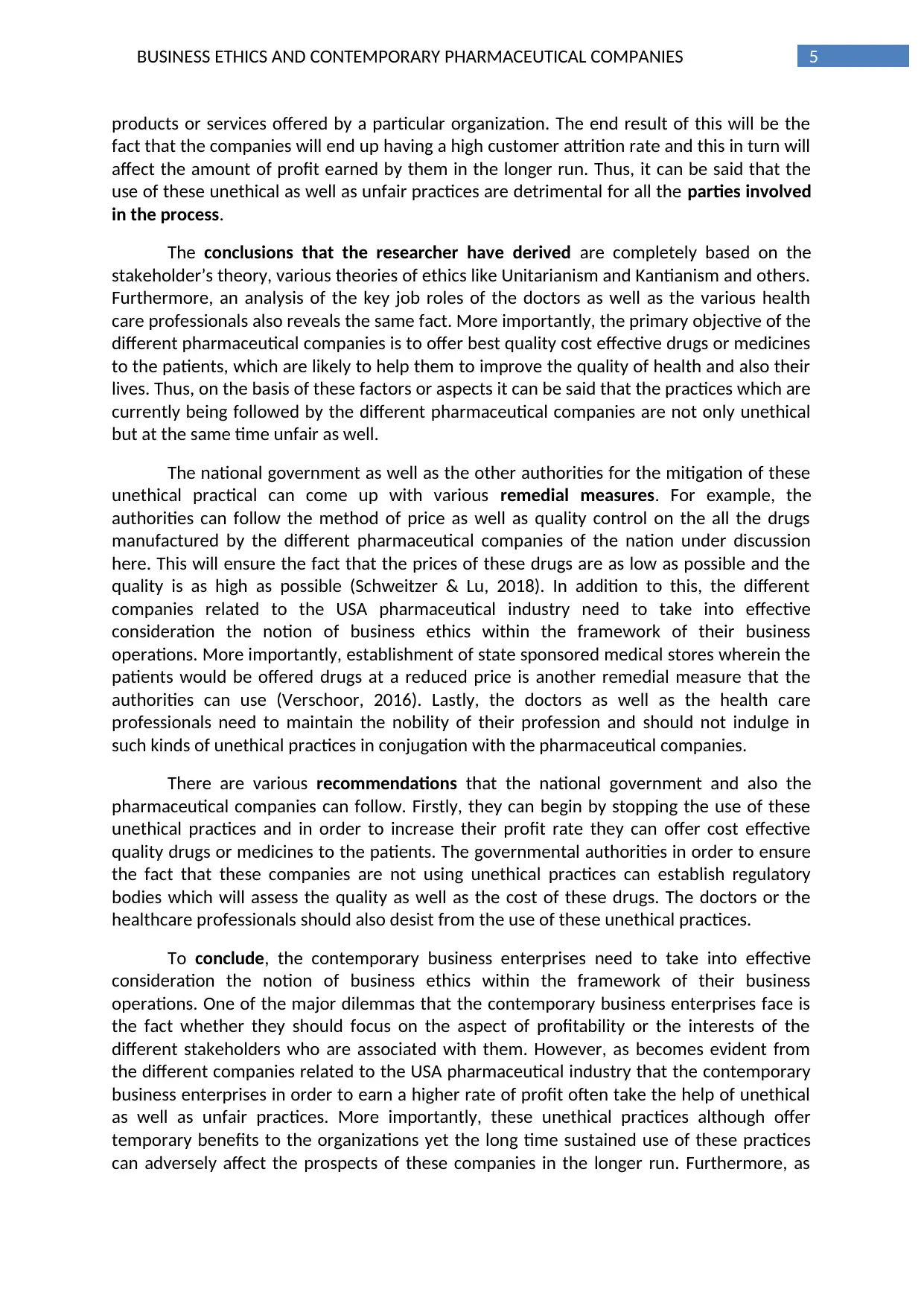
5BUSINESS ETHICS AND CONTEMPORARY PHARMACEUTICAL COMPANIES
products or services offered by a particular organization. The end result of this will be the
fact that the companies will end up having a high customer attrition rate and this in turn will
affect the amount of profit earned by them in the longer run. Thus, it can be said that the
use of these unethical as well as unfair practices are detrimental for all the parties involved
in the process.
The conclusions that the researcher have derived are completely based on the
stakeholder’s theory, various theories of ethics like Unitarianism and Kantianism and others.
Furthermore, an analysis of the key job roles of the doctors as well as the various health
care professionals also reveals the same fact. More importantly, the primary objective of the
different pharmaceutical companies is to offer best quality cost effective drugs or medicines
to the patients, which are likely to help them to improve the quality of health and also their
lives. Thus, on the basis of these factors or aspects it can be said that the practices which are
currently being followed by the different pharmaceutical companies are not only unethical
but at the same time unfair as well.
The national government as well as the other authorities for the mitigation of these
unethical practical can come up with various remedial measures. For example, the
authorities can follow the method of price as well as quality control on the all the drugs
manufactured by the different pharmaceutical companies of the nation under discussion
here. This will ensure the fact that the prices of these drugs are as low as possible and the
quality is as high as possible (Schweitzer & Lu, 2018). In addition to this, the different
companies related to the USA pharmaceutical industry need to take into effective
consideration the notion of business ethics within the framework of their business
operations. More importantly, establishment of state sponsored medical stores wherein the
patients would be offered drugs at a reduced price is another remedial measure that the
authorities can use (Verschoor, 2016). Lastly, the doctors as well as the health care
professionals need to maintain the nobility of their profession and should not indulge in
such kinds of unethical practices in conjugation with the pharmaceutical companies.
There are various recommendations that the national government and also the
pharmaceutical companies can follow. Firstly, they can begin by stopping the use of these
unethical practices and in order to increase their profit rate they can offer cost effective
quality drugs or medicines to the patients. The governmental authorities in order to ensure
the fact that these companies are not using unethical practices can establish regulatory
bodies which will assess the quality as well as the cost of these drugs. The doctors or the
healthcare professionals should also desist from the use of these unethical practices.
To conclude, the contemporary business enterprises need to take into effective
consideration the notion of business ethics within the framework of their business
operations. One of the major dilemmas that the contemporary business enterprises face is
the fact whether they should focus on the aspect of profitability or the interests of the
different stakeholders who are associated with them. However, as becomes evident from
the different companies related to the USA pharmaceutical industry that the contemporary
business enterprises in order to earn a higher rate of profit often take the help of unethical
as well as unfair practices. More importantly, these unethical practices although offer
temporary benefits to the organizations yet the long time sustained use of these practices
can adversely affect the prospects of these companies in the longer run. Furthermore, as
products or services offered by a particular organization. The end result of this will be the
fact that the companies will end up having a high customer attrition rate and this in turn will
affect the amount of profit earned by them in the longer run. Thus, it can be said that the
use of these unethical as well as unfair practices are detrimental for all the parties involved
in the process.
The conclusions that the researcher have derived are completely based on the
stakeholder’s theory, various theories of ethics like Unitarianism and Kantianism and others.
Furthermore, an analysis of the key job roles of the doctors as well as the various health
care professionals also reveals the same fact. More importantly, the primary objective of the
different pharmaceutical companies is to offer best quality cost effective drugs or medicines
to the patients, which are likely to help them to improve the quality of health and also their
lives. Thus, on the basis of these factors or aspects it can be said that the practices which are
currently being followed by the different pharmaceutical companies are not only unethical
but at the same time unfair as well.
The national government as well as the other authorities for the mitigation of these
unethical practical can come up with various remedial measures. For example, the
authorities can follow the method of price as well as quality control on the all the drugs
manufactured by the different pharmaceutical companies of the nation under discussion
here. This will ensure the fact that the prices of these drugs are as low as possible and the
quality is as high as possible (Schweitzer & Lu, 2018). In addition to this, the different
companies related to the USA pharmaceutical industry need to take into effective
consideration the notion of business ethics within the framework of their business
operations. More importantly, establishment of state sponsored medical stores wherein the
patients would be offered drugs at a reduced price is another remedial measure that the
authorities can use (Verschoor, 2016). Lastly, the doctors as well as the health care
professionals need to maintain the nobility of their profession and should not indulge in
such kinds of unethical practices in conjugation with the pharmaceutical companies.
There are various recommendations that the national government and also the
pharmaceutical companies can follow. Firstly, they can begin by stopping the use of these
unethical practices and in order to increase their profit rate they can offer cost effective
quality drugs or medicines to the patients. The governmental authorities in order to ensure
the fact that these companies are not using unethical practices can establish regulatory
bodies which will assess the quality as well as the cost of these drugs. The doctors or the
healthcare professionals should also desist from the use of these unethical practices.
To conclude, the contemporary business enterprises need to take into effective
consideration the notion of business ethics within the framework of their business
operations. One of the major dilemmas that the contemporary business enterprises face is
the fact whether they should focus on the aspect of profitability or the interests of the
different stakeholders who are associated with them. However, as becomes evident from
the different companies related to the USA pharmaceutical industry that the contemporary
business enterprises in order to earn a higher rate of profit often take the help of unethical
as well as unfair practices. More importantly, these unethical practices although offer
temporary benefits to the organizations yet the long time sustained use of these practices
can adversely affect the prospects of these companies in the longer run. Furthermore, as
⊘ This is a preview!⊘
Do you want full access?
Subscribe today to unlock all pages.

Trusted by 1+ million students worldwide
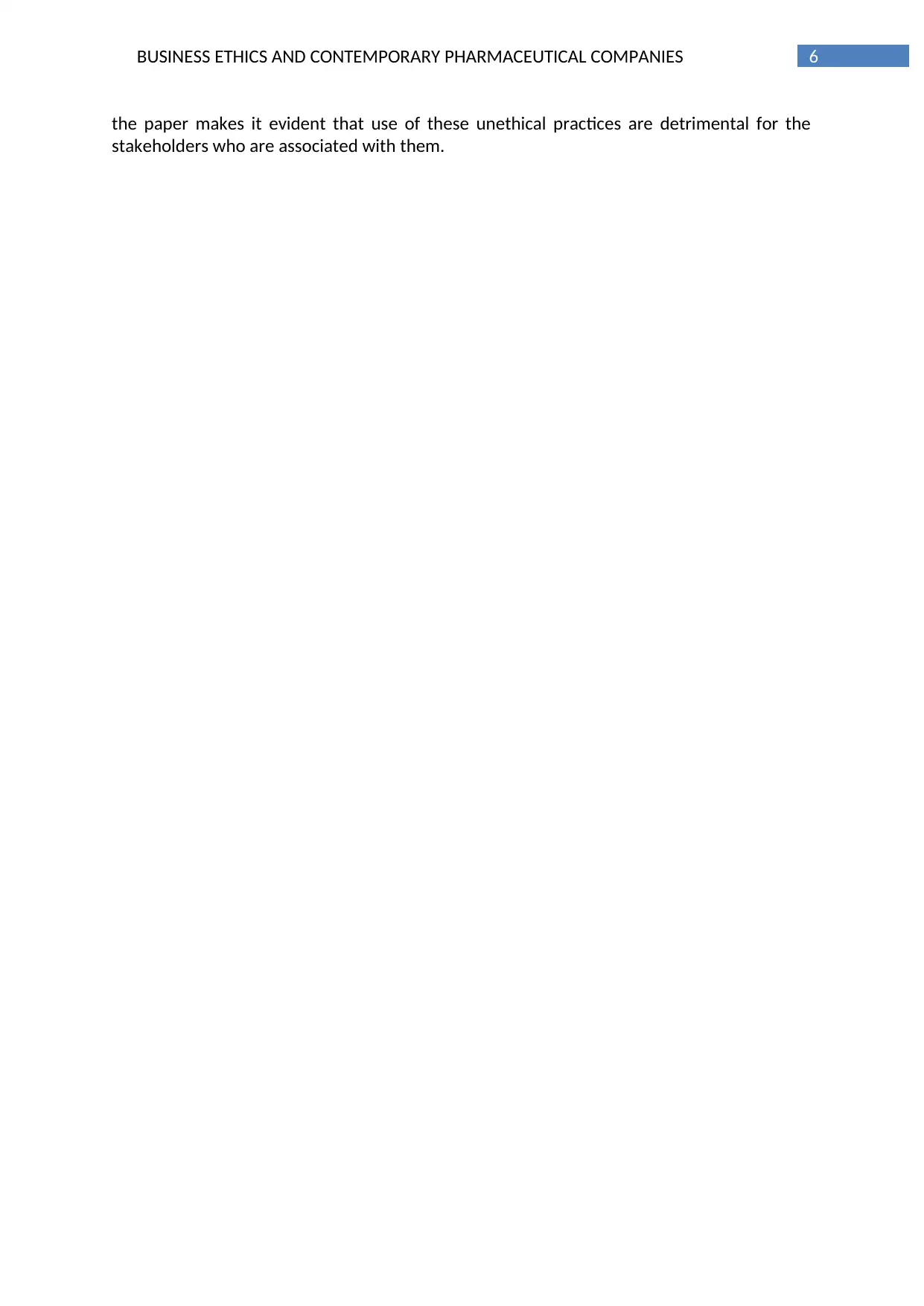
6BUSINESS ETHICS AND CONTEMPORARY PHARMACEUTICAL COMPANIES
the paper makes it evident that use of these unethical practices are detrimental for the
stakeholders who are associated with them.
the paper makes it evident that use of these unethical practices are detrimental for the
stakeholders who are associated with them.
Paraphrase This Document
Need a fresh take? Get an instant paraphrase of this document with our AI Paraphraser
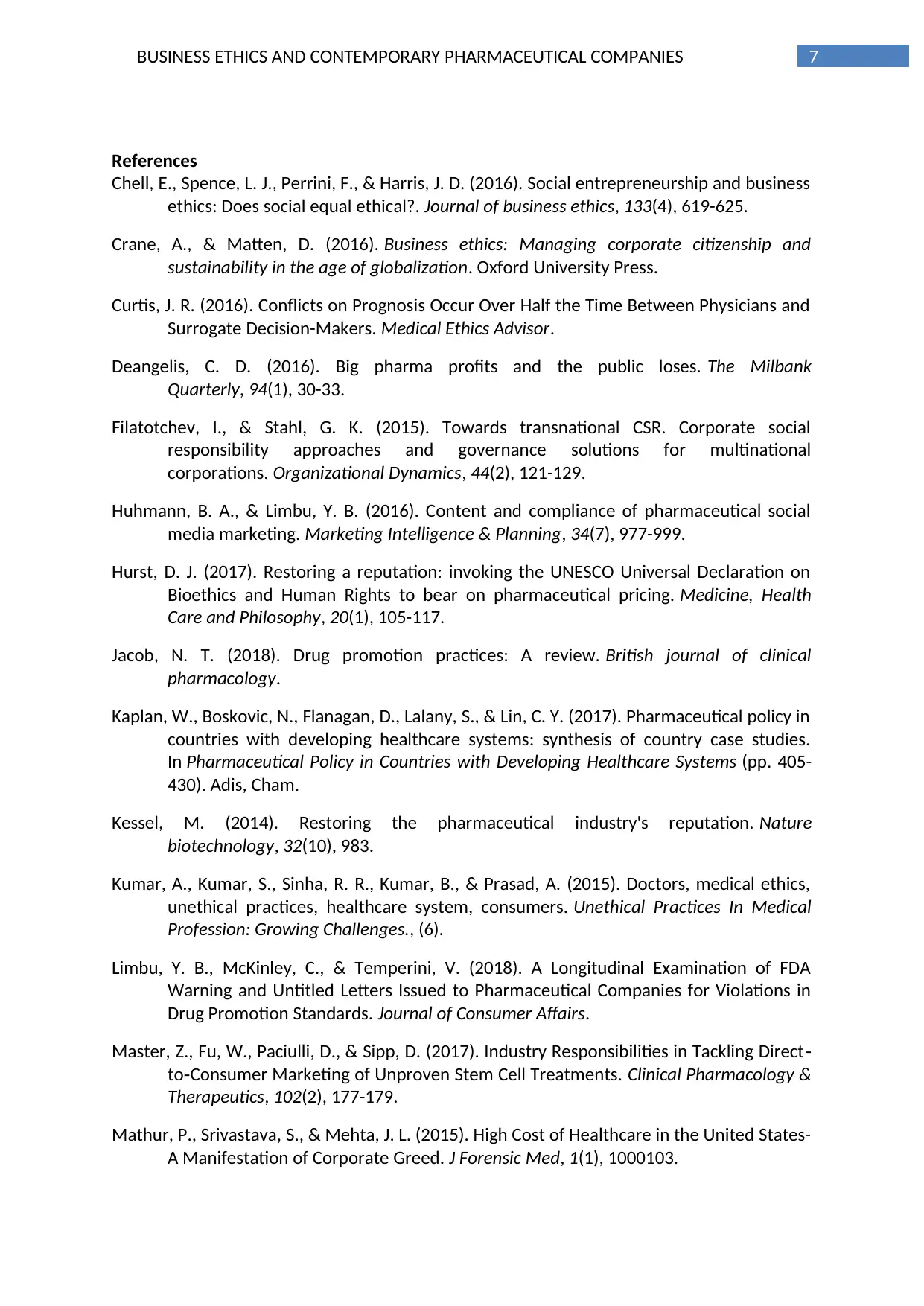
7BUSINESS ETHICS AND CONTEMPORARY PHARMACEUTICAL COMPANIES
References
Chell, E., Spence, L. J., Perrini, F., & Harris, J. D. (2016). Social entrepreneurship and business
ethics: Does social equal ethical?. Journal of business ethics, 133(4), 619-625.
Crane, A., & Matten, D. (2016). Business ethics: Managing corporate citizenship and
sustainability in the age of globalization. Oxford University Press.
Curtis, J. R. (2016). Conflicts on Prognosis Occur Over Half the Time Between Physicians and
Surrogate Decision-Makers. Medical Ethics Advisor.
Deangelis, C. D. (2016). Big pharma profits and the public loses. The Milbank
Quarterly, 94(1), 30-33.
Filatotchev, I., & Stahl, G. K. (2015). Towards transnational CSR. Corporate social
responsibility approaches and governance solutions for multinational
corporations. Organizational Dynamics, 44(2), 121-129.
Huhmann, B. A., & Limbu, Y. B. (2016). Content and compliance of pharmaceutical social
media marketing. Marketing Intelligence & Planning, 34(7), 977-999.
Hurst, D. J. (2017). Restoring a reputation: invoking the UNESCO Universal Declaration on
Bioethics and Human Rights to bear on pharmaceutical pricing. Medicine, Health
Care and Philosophy, 20(1), 105-117.
Jacob, N. T. (2018). Drug promotion practices: A review. British journal of clinical
pharmacology.
Kaplan, W., Boskovic, N., Flanagan, D., Lalany, S., & Lin, C. Y. (2017). Pharmaceutical policy in
countries with developing healthcare systems: synthesis of country case studies.
In Pharmaceutical Policy in Countries with Developing Healthcare Systems (pp. 405-
430). Adis, Cham.
Kessel, M. (2014). Restoring the pharmaceutical industry's reputation. Nature
biotechnology, 32(10), 983.
Kumar, A., Kumar, S., Sinha, R. R., Kumar, B., & Prasad, A. (2015). Doctors, medical ethics,
unethical practices, healthcare system, consumers. Unethical Practices In Medical
Profession: Growing Challenges., (6).
Limbu, Y. B., McKinley, C., & Temperini, V. (2018). A Longitudinal Examination of FDA
Warning and Untitled Letters Issued to Pharmaceutical Companies for Violations in
Drug Promotion Standards. Journal of Consumer Affairs.
Master, Z., Fu, W., Paciulli, D., & Sipp, D. (2017). Industry Responsibilities in Tackling Direct‐
to Consumer Marketing of Unproven Stem Cell Treatments.‐ Clinical Pharmacology &
Therapeutics, 102(2), 177-179.
Mathur, P., Srivastava, S., & Mehta, J. L. (2015). High Cost of Healthcare in the United States-
A Manifestation of Corporate Greed. J Forensic Med, 1(1), 1000103.
References
Chell, E., Spence, L. J., Perrini, F., & Harris, J. D. (2016). Social entrepreneurship and business
ethics: Does social equal ethical?. Journal of business ethics, 133(4), 619-625.
Crane, A., & Matten, D. (2016). Business ethics: Managing corporate citizenship and
sustainability in the age of globalization. Oxford University Press.
Curtis, J. R. (2016). Conflicts on Prognosis Occur Over Half the Time Between Physicians and
Surrogate Decision-Makers. Medical Ethics Advisor.
Deangelis, C. D. (2016). Big pharma profits and the public loses. The Milbank
Quarterly, 94(1), 30-33.
Filatotchev, I., & Stahl, G. K. (2015). Towards transnational CSR. Corporate social
responsibility approaches and governance solutions for multinational
corporations. Organizational Dynamics, 44(2), 121-129.
Huhmann, B. A., & Limbu, Y. B. (2016). Content and compliance of pharmaceutical social
media marketing. Marketing Intelligence & Planning, 34(7), 977-999.
Hurst, D. J. (2017). Restoring a reputation: invoking the UNESCO Universal Declaration on
Bioethics and Human Rights to bear on pharmaceutical pricing. Medicine, Health
Care and Philosophy, 20(1), 105-117.
Jacob, N. T. (2018). Drug promotion practices: A review. British journal of clinical
pharmacology.
Kaplan, W., Boskovic, N., Flanagan, D., Lalany, S., & Lin, C. Y. (2017). Pharmaceutical policy in
countries with developing healthcare systems: synthesis of country case studies.
In Pharmaceutical Policy in Countries with Developing Healthcare Systems (pp. 405-
430). Adis, Cham.
Kessel, M. (2014). Restoring the pharmaceutical industry's reputation. Nature
biotechnology, 32(10), 983.
Kumar, A., Kumar, S., Sinha, R. R., Kumar, B., & Prasad, A. (2015). Doctors, medical ethics,
unethical practices, healthcare system, consumers. Unethical Practices In Medical
Profession: Growing Challenges., (6).
Limbu, Y. B., McKinley, C., & Temperini, V. (2018). A Longitudinal Examination of FDA
Warning and Untitled Letters Issued to Pharmaceutical Companies for Violations in
Drug Promotion Standards. Journal of Consumer Affairs.
Master, Z., Fu, W., Paciulli, D., & Sipp, D. (2017). Industry Responsibilities in Tackling Direct‐
to Consumer Marketing of Unproven Stem Cell Treatments.‐ Clinical Pharmacology &
Therapeutics, 102(2), 177-179.
Mathur, P., Srivastava, S., & Mehta, J. L. (2015). High Cost of Healthcare in the United States-
A Manifestation of Corporate Greed. J Forensic Med, 1(1), 1000103.
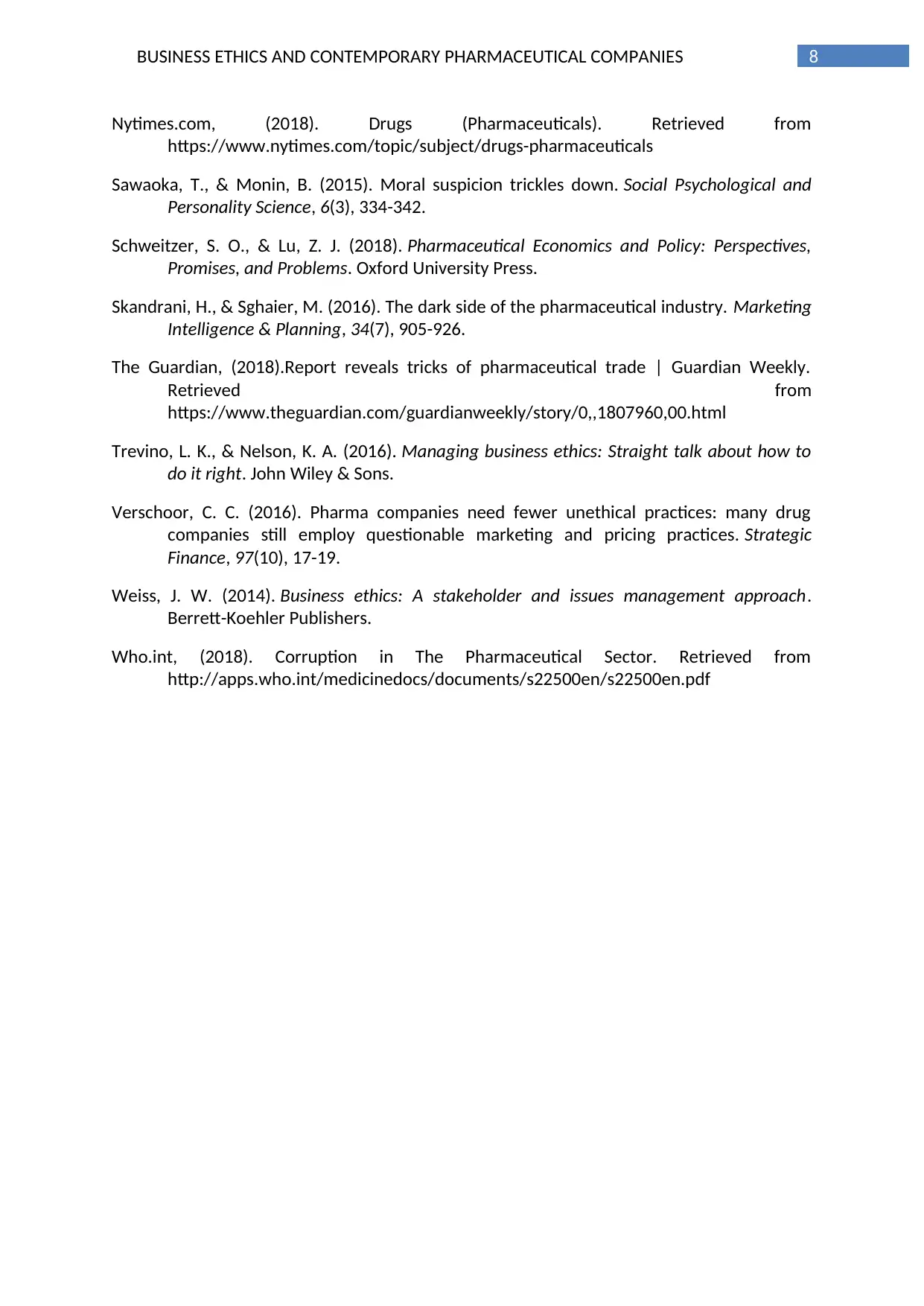
8BUSINESS ETHICS AND CONTEMPORARY PHARMACEUTICAL COMPANIES
Nytimes.com, (2018). Drugs (Pharmaceuticals). Retrieved from
https://www.nytimes.com/topic/subject/drugs-pharmaceuticals
Sawaoka, T., & Monin, B. (2015). Moral suspicion trickles down. Social Psychological and
Personality Science, 6(3), 334-342.
Schweitzer, S. O., & Lu, Z. J. (2018). Pharmaceutical Economics and Policy: Perspectives,
Promises, and Problems. Oxford University Press.
Skandrani, H., & Sghaier, M. (2016). The dark side of the pharmaceutical industry. Marketing
Intelligence & Planning, 34(7), 905-926.
The Guardian, (2018).Report reveals tricks of pharmaceutical trade | Guardian Weekly.
Retrieved from
https://www.theguardian.com/guardianweekly/story/0,,1807960,00.html
Trevino, L. K., & Nelson, K. A. (2016). Managing business ethics: Straight talk about how to
do it right. John Wiley & Sons.
Verschoor, C. C. (2016). Pharma companies need fewer unethical practices: many drug
companies still employ questionable marketing and pricing practices. Strategic
Finance, 97(10), 17-19.
Weiss, J. W. (2014). Business ethics: A stakeholder and issues management approach.
Berrett-Koehler Publishers.
Who.int, (2018). Corruption in The Pharmaceutical Sector. Retrieved from
http://apps.who.int/medicinedocs/documents/s22500en/s22500en.pdf
Nytimes.com, (2018). Drugs (Pharmaceuticals). Retrieved from
https://www.nytimes.com/topic/subject/drugs-pharmaceuticals
Sawaoka, T., & Monin, B. (2015). Moral suspicion trickles down. Social Psychological and
Personality Science, 6(3), 334-342.
Schweitzer, S. O., & Lu, Z. J. (2018). Pharmaceutical Economics and Policy: Perspectives,
Promises, and Problems. Oxford University Press.
Skandrani, H., & Sghaier, M. (2016). The dark side of the pharmaceutical industry. Marketing
Intelligence & Planning, 34(7), 905-926.
The Guardian, (2018).Report reveals tricks of pharmaceutical trade | Guardian Weekly.
Retrieved from
https://www.theguardian.com/guardianweekly/story/0,,1807960,00.html
Trevino, L. K., & Nelson, K. A. (2016). Managing business ethics: Straight talk about how to
do it right. John Wiley & Sons.
Verschoor, C. C. (2016). Pharma companies need fewer unethical practices: many drug
companies still employ questionable marketing and pricing practices. Strategic
Finance, 97(10), 17-19.
Weiss, J. W. (2014). Business ethics: A stakeholder and issues management approach.
Berrett-Koehler Publishers.
Who.int, (2018). Corruption in The Pharmaceutical Sector. Retrieved from
http://apps.who.int/medicinedocs/documents/s22500en/s22500en.pdf
⊘ This is a preview!⊘
Do you want full access?
Subscribe today to unlock all pages.

Trusted by 1+ million students worldwide
1 out of 9
Related Documents
Your All-in-One AI-Powered Toolkit for Academic Success.
+13062052269
info@desklib.com
Available 24*7 on WhatsApp / Email
![[object Object]](/_next/static/media/star-bottom.7253800d.svg)
Unlock your academic potential
Copyright © 2020–2026 A2Z Services. All Rights Reserved. Developed and managed by ZUCOL.





